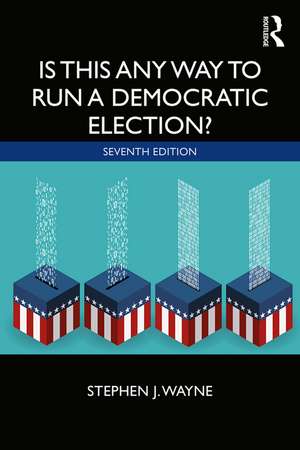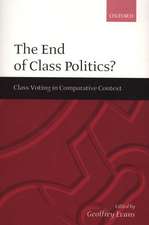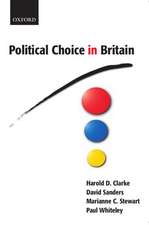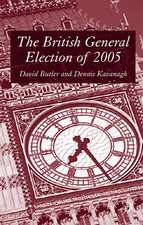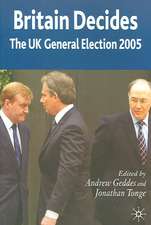Is This Any Way to Run a Democratic Election?
Autor Stephen J. Wayneen Limba Engleză Paperback – 6 sep 2019
New to the Seventh Edition:
- New data and timely illustrations from the 2016 and 2018 elections, looking ahead to 2020 election.
- The growing importance of social media (Facebook, YouTube, Twitter) and its impact, good and bad, on recent campaigns.
- Foreign interference in the 2016 and 2018 national elections.
- The integrity of campaign communications—hacking, rumoring, instantaneous news, and the effect of fact-checking.
- Money: the role of Super PACs and billionaire donors; the impact of campaign spending on the candidates and on election outcomes.
- New connections between the "Did you know that" chapter introductions to the exercises at the end.
- More online references in the suggested readings.
| Toate formatele și edițiile | Preț | Express |
|---|---|---|
| Paperback (3) | 327.10 lei 6-8 săpt. | |
| Taylor & Francis – 14 mar 2024 | 327.10 lei 6-8 săpt. | |
| Taylor & Francis – 6 sep 2019 | 383.29 lei 6-8 săpt. | |
| SAGE Publications – 9 sep 2013 | 467.80 lei 6-8 săpt. | |
| Hardback (2) | 974.30 lei 6-8 săpt. | |
| Taylor & Francis – 14 mar 2024 | 974.30 lei 6-8 săpt. | |
| Taylor & Francis – 12 sep 2019 | 992.90 lei 6-8 săpt. |
Preț: 383.29 lei
Nou
Puncte Express: 575
Preț estimativ în valută:
73.39€ • 75.28$ • 61.79£
73.39€ • 75.28$ • 61.79£
Carte tipărită la comandă
Livrare economică 27 februarie-13 martie
Preluare comenzi: 021 569.72.76
Specificații
ISBN-13: 9780367336479
ISBN-10: 0367336472
Pagini: 300
Ilustrații: 26 Tables, black and white
Dimensiuni: 152 x 229 x 18 mm
Greutate: 0.38 kg
Ediția:7 New edition
Editura: Taylor & Francis
Colecția Routledge
Locul publicării:Oxford, United Kingdom
ISBN-10: 0367336472
Pagini: 300
Ilustrații: 26 Tables, black and white
Dimensiuni: 152 x 229 x 18 mm
Greutate: 0.38 kg
Ediția:7 New edition
Editura: Taylor & Francis
Colecția Routledge
Locul publicării:Oxford, United Kingdom
Public țintă
Postgraduate and UndergraduateCuprins
1. Democratic Elections: What’s the Problem? 2. Popular Base of American Electoral Politics 3. How Representative Are American Elections? 4. Has Money Corrupted Our Electoral Process? 5. News Media Coverage: Fair or Unfair? True or False? 6. Are American Parties Still Representative? 7. The Nomination Process: Whose Is It Anyway? 8. Campaign Communications: How Much Do They Matter? 9. Elections and Government: A Tenuous Connection
Notă biografică
Stephen J. Wayne (BA—University of Rochester, MA, PhD—Columbia University) is a well-known author and lecturer on the American presidency and electoral politics. A Professor of Government Emeritus at Georgetown University, he has also taught at United States Naval Postgraduate School, Ohio Wesleyan University, and The George Washington University. A Washington-based "insider" for over 50 years, Wayne is frequently quoted by White House journalists and regularly appears on television and radio news shows. He has written or edited 12 books, published in 31 editions, and written over 100 articles, chapters, and reviews that have appeared in professional journals, scholarly compilations, newspapers, and magazines.
Professor Wayne lectures widely at home and abroad to international visitors, college students, federal executives, and business leaders. He has testified before Congress on the subject of presidential elections and governance and before Democratic and Republican party advisory committees on the presidential nomination processes. He participated in transition projects for the National Academy of Public Administration and the Presidency Research Group.
Professor Wayne lectures widely at home and abroad to international visitors, college students, federal executives, and business leaders. He has testified before Congress on the subject of presidential elections and governance and before Democratic and Republican party advisory committees on the presidential nomination processes. He participated in transition projects for the National Academy of Public Administration and the Presidency Research Group.
Recenzii
Praise for the Seventh Edition:
My students have enjoyed reading Is This Any Way to Run a Democratic Election? for over a decade. It has consistently illuminated the major issues with our electoral process. The addition of a comparative perspective in this edition has made this book even more useful to me. —Martin P. Wattenberg, University of California, Irvine
Praise for Is This Any Way to Run a Democratic Election?:
If you aren't lucky enough to be enrolled in one of Prof. Wayne's classes, this smart, accessible book is the next best option. It allows readers to explore what works and what doesn't—and helps them to analyze for themselves how and why. —Rebecca Sinderbrand, Yale University; The Washington Post
Do democratic elections accomplish in practice what they promise in theory? This fresh edition of Wayne’s seminal book looks back at the 2015–2016 election cycle and reminds readers that many of the contributing factors to Donald Trump's success are features of the American election process rather than exceptions to it. —Lauren A. Wright, Princeton University; Author of On Behalf of the President
In a time of rampant questions about domestic elections and "fake news," this edition of Stephen J. Wayne's book is both timely and relevant. The questions he raises about the integrity of our state election systems and the impact and role of social media, money, the nomination process, and political parties in our election processes are urgent today. Highly recommended. —John Kenneth White, Catholic University of America; Author of What Happened to the Republican Party?
A comprehensive study of every component of the American electoral process… and essential reading for anyone who seeks to understand how American elections inform politics and policy making. By addressing key issues in the 2016 elections, from social media to voter ID laws, Wayne grounds contemporary electoral questions in enduring debates about American democratic governance. —Meena Bose, Hofstra University; Director, Peter S. Kalikow Center for the Study of the American Presidency
Wayne tackles many of the great questions of American politics—voter turnout, representation, the roles of media and money, parties, nominations, campaigns, and government responsiveness—with an engaging, accessible, and informed discussion that will prove useful in a variety of undergraduate courses. —George C. Edwards III, Texas A&M University
Timely, insightful, and comprehensive, this book is a must-read for students, scholars, and instructors: Wayne provides a clear analytical framework for understanding the American system and thought-provoking ideas about elections past and future. —Margaret Tseng, Marymount University
My students have enjoyed reading Is This Any Way to Run a Democratic Election? for over a decade. It has consistently illuminated the major issues with our electoral process. The addition of a comparative perspective in this edition has made this book even more useful to me. —Martin P. Wattenberg, University of California, Irvine
Praise for Is This Any Way to Run a Democratic Election?:
If you aren't lucky enough to be enrolled in one of Prof. Wayne's classes, this smart, accessible book is the next best option. It allows readers to explore what works and what doesn't—and helps them to analyze for themselves how and why. —Rebecca Sinderbrand, Yale University; The Washington Post
Do democratic elections accomplish in practice what they promise in theory? This fresh edition of Wayne’s seminal book looks back at the 2015–2016 election cycle and reminds readers that many of the contributing factors to Donald Trump's success are features of the American election process rather than exceptions to it. —Lauren A. Wright, Princeton University; Author of On Behalf of the President
In a time of rampant questions about domestic elections and "fake news," this edition of Stephen J. Wayne's book is both timely and relevant. The questions he raises about the integrity of our state election systems and the impact and role of social media, money, the nomination process, and political parties in our election processes are urgent today. Highly recommended. —John Kenneth White, Catholic University of America; Author of What Happened to the Republican Party?
A comprehensive study of every component of the American electoral process… and essential reading for anyone who seeks to understand how American elections inform politics and policy making. By addressing key issues in the 2016 elections, from social media to voter ID laws, Wayne grounds contemporary electoral questions in enduring debates about American democratic governance. —Meena Bose, Hofstra University; Director, Peter S. Kalikow Center for the Study of the American Presidency
Wayne tackles many of the great questions of American politics—voter turnout, representation, the roles of media and money, parties, nominations, campaigns, and government responsiveness—with an engaging, accessible, and informed discussion that will prove useful in a variety of undergraduate courses. —George C. Edwards III, Texas A&M University
Timely, insightful, and comprehensive, this book is a must-read for students, scholars, and instructors: Wayne provides a clear analytical framework for understanding the American system and thought-provoking ideas about elections past and future. —Margaret Tseng, Marymount University
Descriere
The 2016 and 2018 elections are over, but debates over the fairness and accuracy of our electoral process have never been more contentious. Hacking, fake news, a 'rigged system', voter ID challenges, Super PACs and an Electoral College defying the popular vote count all lead to a common concern: Is this any way to run a democratic election?
